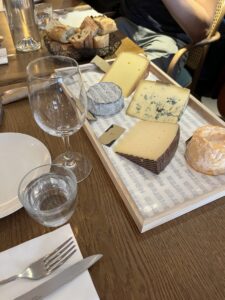Prior to my departure to Paris for the Emory Neuroscience and Behavioral Biology summer study abroad program, I was told by numerous friends and family to “have some wine and cheese” for them. Many Americans (typically while pouring another glass of red wine) find themselves wondering how Parisians appear so healthy considering the stereotypical cheese and wine consumption in France. Among the many cultural differences I have already noticed my first week in Paris, both the different diet of Parisians and the different attitude towards life and work are quite clear. While engaging in the culture, I realized diet and life-work balance both connect to stress and I began to contemplate how these may all contribute to the health of the Parisian population.
Walking through Fromagerie Monbleu, the cheese shop hosting our class sponsored cheese tasting, I eagerly anticipated learning how to make sophisticated commentary on these much appreciated foods. What I did not expect, was to learn about the biological significance of taste and flavor. At Monbleu, the definition of taste focuses on how something feels to your mouth and detects sweet, sour, salty, bitter, and umami. I’m still a bit unsure about that last one, but it was described as savory and meaty. However, flavor is detected by the nose and breathing in maximizes the sensations from flavor. To enjoy food to the fullest, time is spent savoring it and engaging in the experience of tasting. Therefore, tasting is different from simply eating food as a means of caloric and nutritional intake. While we need to EAT food to survive, I was surprised to learn in class that there is biological significance to taste as well. Separate from the composition of food (the amount of carbs, fats, proteins etc.) that we put into our body, palatable foods which are pleasing to the taste have their own effect on our bodies through our brain’s reward system. Perhaps the Parisian’s enjoyment of delicious food (even if not the “healthiest” in terms of nutrition), contributes to their overall well-being. It was found in female rats that having palatable foods decreases anxiety and stress (Egan et al., 2019). Afterall, stress can be detrimental to our health. If indulging in some “comfort food” that happens to be less nutritious or low-fat results in a lesser stress response, it may be healthier for us to indulge in some cheese and crackers like Parisians than remain in a high stress state while “eating healthy”.


Works Cited:
Egan, A. E., Seemiller, L. R., Packard, A. E. B., Solomon, M. B., & Ulrich-Lai, Y. M. (2019). Palatable food reduces anxiety-like behaviors and HPA axis responses to stress in female rats in an estrous-cycle specific manner. Hormones and Behavior, 115, 104557. https://doi.org/10.1016/j.yhbeh.2019.07.005
